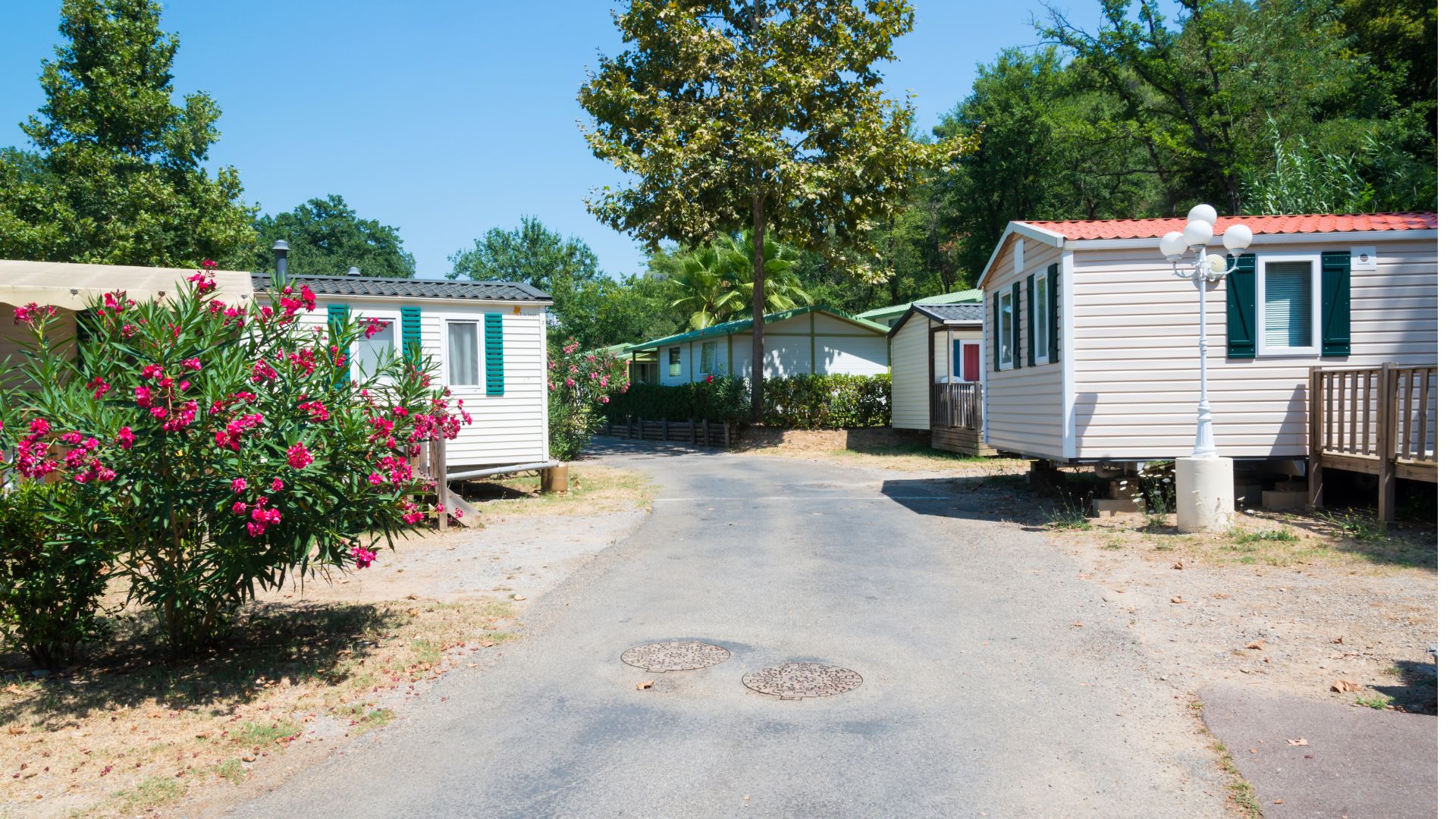Table of Contents
In this article:
- Over 5.2 million people in the United States live in a mobile home.
- Investing in mobile homes can be profitable, but it's important to consider several factors that may affect cash flow.
- Working with a mobile home property manager can alleviate many of the issues that may arise once you've invested in mobile homes or mobile home parks.
Investing in mobile homes can be incredibly lucrative. But if you don’t know what you’re looking for or how to leverage this method, it can also cost you your shirt. Teifke Real Estate education crew has put together this quick-start guide on everything you need to know before investing in mobile homes.
Mobile Homes As Profitable Real Estate Investments
This corner of the market is often overlooked as the cash cow that it can be. Mobile homes and mobile home parks offer a unique set of benefits from more traditional real estate investments, like lower barriers to entry and fast cash-flow positive revenue.
While the number of mobile homes in the U.S. has fallen by over two million over the last five years,[1] there are still 5.6 million people who call them home.[2] So why is now the perfect time to talk about investing in them?
Over the last few years, we’ve all seen the housing market skyrocket and plateau at a newer, higher normal. And we all know that what the housing market does, the rental market does. As the price of buying a home continued to climb, so did the cost of renting.
When the median income doesn’t rise to meet the newer, more costly demand, you have a housing gap.
Where there is a gap, there is opportunity.
All those people that can no longer afford the local rental rates or who are looking to sell their home at a peak price and downsize amidst the boom still need a place to live. Mobile homes have served a diverse section of the market for decades, and they will continue to do so. Perhaps now more than ever.
Take the First Step in Achieving Your Real Estate Goals
Contact UsUnderstanding The Mobile Home Niche
Mobile homes or trailer homes are prefabricated structures that you can deliver, park, and inhabit all at once. They’re factory-built on a permanent base or chassis, making for easy transportation.
They are typically smaller homes, ranging from 800 to 1,200 square feet for single-wide units and more for double-wide units. A double-wide mobile home is essentially the size of two singles but is affixed by a central seam in the middle after delivery.
Mobile Homes Vs. Manufactured Homes
These housing units are different in a few ways but are both different forms of prefabricated homes. Mobile home, in particular, refers to a unit that was constructed before the National Mobile Home Construction and Safety Act of 1974 or before the HUD Manufactured Home Construction and Safety Standards of 1976.
According to the Federal Register (a journal published by the National Archives), these measures were put in place to achieve a set of eight goals, one of which is to “ facilitate the availability of affordable manufactured homes and to increase homeownership for all Americans” and another which is to “to ensure that the public interest in, and need for affordable manufactured housing is duly considered.”[3]
In short, mobile homes were fabricated before these acts, and any homes manufactured after were made to adhere to the new and improved standards. Today, there is a diverse catalog of manufactured homes that ranges from tiny portable houses to luxury mobile homes.
Mobile Homes / Manufactured Homes Vs. Modular Homes
Unlike a mobile home, a true modular home is a prefabricated house that was constructed in smaller, individual modules and assembled together on the destination property. This is a very different construction process and price point and should not be confused with mobile homes.
Advantages of Investing In Mobile Homes

There are several ways to get started in the mobile home investing business. From buying and flipping mobile homes or creating your own mobile home park to buying an existing Park and creating consistent rental income, they all lead to high profitability if done well.
Low Capital Investment
Depending on the state of the traditional real estate market, you could be looking at hundreds of thousands, if not millions, of dollars to invest in real property when it’s all said and done. And this number could go up if you were in the business of flipping.
Investing in mobile homes provides a much lower barrier to entry in terms of the capital required to start and the cap of potential finances needed to install any upgrades or make any necessary modifications.
Higher Cash-Flow Potential
Individual mobile homes and mobile home parks cost less upfront, which means there’s less money out of your pocket to begin with. Even though you can’t charge quite as much rent for a modular home as you could a stick-built home, the path to a cash-flow-positive property is much shorter in a mobile home.
Possible Tax Benefits
As with any property, mobile homes can benefit from tax deductions for loan interest, property taxes, and depreciation deductions. This will help you and your investors reduce potential tax liabilities and retain more of the return on your investment.
Disadvantages of Investing In Mobile Homes
Quick profitability aside, there are a number of disadvantages to consider before investing in mobile homes.
Rapid Depreciation
As an asset, a mobile home has limited appreciation potential and can depreciate quickly, much like a car you just drove off the lot. In some cases, if it’s been classified as “real property” or “fixed property,” it may maintain its value, but the structure itself will not appreciate like a stick-built home. This fact often leads many investors to pass on it altogether.
Demographic Vulnerability
Due to the widespread affordability of mobile homes, it can attract a more vulnerable type of tenant that is more likely to default on payment or not remain in the home for a long period of time.
Financing Challenges
If you don’t know how to secure creative or alternative financing, you may find it difficult to secure traditional banking or credit union financing for a mobile home or a mobile home park. These assets are traditionally viewed as risky investments, and you will find more success pursuing alternative financing solutions like private loans or capital investors.
How To Break Into Mobile Home Investing
The property and method that will work best for you will largely depend on the amount of capital you have access to, the state of the market you’re looking to invest in, and the level of rehab that may be needed. However, there are several tried and tested strategies to get started that will suit a multi-faceted approach.
Find Mobile Homes or Mobile Home Parks
Look for an escalating market where tenants may be eager to downsize or purchase something more affordable. Be sure to check for any red flags on the mobile home, such as sagging roofs, water damage, the state of the chassis, any dips in the floor, and any outdated A/C units or ductwork.
While many of these red flags are fixable, your timeline and your rehab budget will determine how much you’re able to update.
Analyze Potential Returns
It’s time to do the math. Consider everything from the initial purchase price, operating expenses, and rental income to vacancy rates, financing costs, and any rehab expenses into the mix. Get a clear picture of every cent that’s going out and estimate what you can expect coming in.
Here is a simple formula to help you do the math:
Purchase Price + Rehab Expenses = Investment
Monthly Operating Costs + Average Monthly Financing Costs = Expenses
Potential Monthly Income – Monthly Expenses = Monthly Cash Flow
Total Investment / Monthly Cash Flow= Months To Pay Off Investment
Exploring Various Financing Options
As mentioned above, traditional financing may not be available. But a truly successful real estate investor must know how to access the funds they need with a quick turnaround.
Explore your options for private money loans. Build relationships with capital investors. Try to secure transactional funding. Look into hard money loans for fast cash. There are multiple avenues you can pursue to secure financing.
Working With A Property Manager
If you’re not managing the property yourself, you must have a clear strategy in place for managing the property manager, mitigating risks, and maintaining the asset’s value as much as possible. Keep open lines of communication and be available as needed to ensure your asset is being managed properly.
Looking to invest in a mobile home and need a strategic partner? Contact Teifke today and learn how we can help you achieve your real estate goals.
Frequently Asked Questions About Investing In Mobile Homes
Below are some of the most frequently asked related to mobile home investing.
Yes, it can be! Your success depends greatly on finding a great deal, in a great location, with a clear path to activating cash flow.
Teifke Real Estate is based in Texas, where there is a strong market for investing in mobile homes. Where you invest your money depends on how you plan to get a return. See this additional resource: Best States To Invest In Real Estate.
You can buy an entire mobile home park that includes the homes and the land, buy individual mobile homes on land, or you can buy the land and rent out individual spaces. The latter option is far less work on the management end.
[1] Statista Research Department (2022, January 7). Number of mobile U.S. homes 2015-2023. Statista. Retrieved from https://www.statista.com/statistics/1072392/number-of-mobile-homes-usa-timeline/ 4, April 2023
[2] The CFPB Office for Older Americans –. (n.d.). Data spotlight: Profiles of older adults living in Mobile homes. Consumer Financial Protection Bureau. Retrieved from https://www.consumerfinance.gov/data-research/research-reports/data-spotlight-profiles-of-older-adults-living-in-mobile-homes/full-report/# 4 April, 2023
[3 The Federal Register. (n.d.). Manufactured Home Construction and Safety Standards. Retrieved from https://www.federalregister.gov/documents/2010/07/13/2010-16724/manufactured-home-construction-and-safety-standards 4, April, 2023





